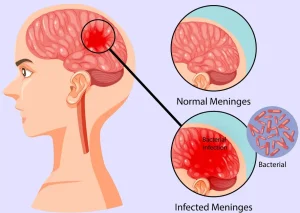Overview
Diagnosis
Meningitis is diagnosed by a healthcare professional using medical history, a physical exam, and specific tests.
Common diagnostic tests include:
-
Blood cultures, which involve placing a blood sample in a special dish to see if bacteria or other germs grow. A stained slide can also be examined under a microscope to identify pathogens.
-
Imaging, such as CT or MRI scans of the head, which may reveal swelling or irritation. Chest or sinus X-rays or CT scans can help identify infections linked to meningitis.
-
Spinal tap, also called a lumbar puncture, to collect cerebrospinal fluid. In meningitis, this fluid often shows low sugar levels, elevated white blood cell counts, and higher protein. Studying this fluid can help determine the cause, including DNA-based tests for viral meningitis, known as polymerase chain reaction (PCR) tests.
Treatment
Treatment for meningitis depends on the underlying cause.
Bacterial meningitis
Immediate treatment is critical and typically involves intravenous antibiotics. Corticosteroids may also be used to reduce brain swelling and lower the risk of complications such as seizures.
-
Broad-spectrum antibiotics are given initially until the specific germ is identified.
-
Corticosteroids may help control inflammation.
-
Antiviral medicines are prescribed if the infection is caused by a herpes virus.
Viral meningitis
Viral meningitis usually resolves on its own within a few weeks. Treatment focuses on symptom relief:
-
Bed rest
-
Drinking plenty of fluids
-
Pain medicine for fever and body aches
Other types of meningitis
Treatment depends on the specific cause:
-
Antifungal medicines for fungal meningitis
-
Combination antibiotics for tuberculous meningitis, often after lab confirmation due to potential side effects
-
Corticosteroids for meningitis caused by allergic reactions or autoimmune disease
-
Cancer-related meningitis requires treatment targeting the underlying cancer
-
Some cases may resolve without treatment, depending on the cause
This structured approach helps healthcare professionals manage meningitis effectively while reducing the risk of complications.
Advertisement

